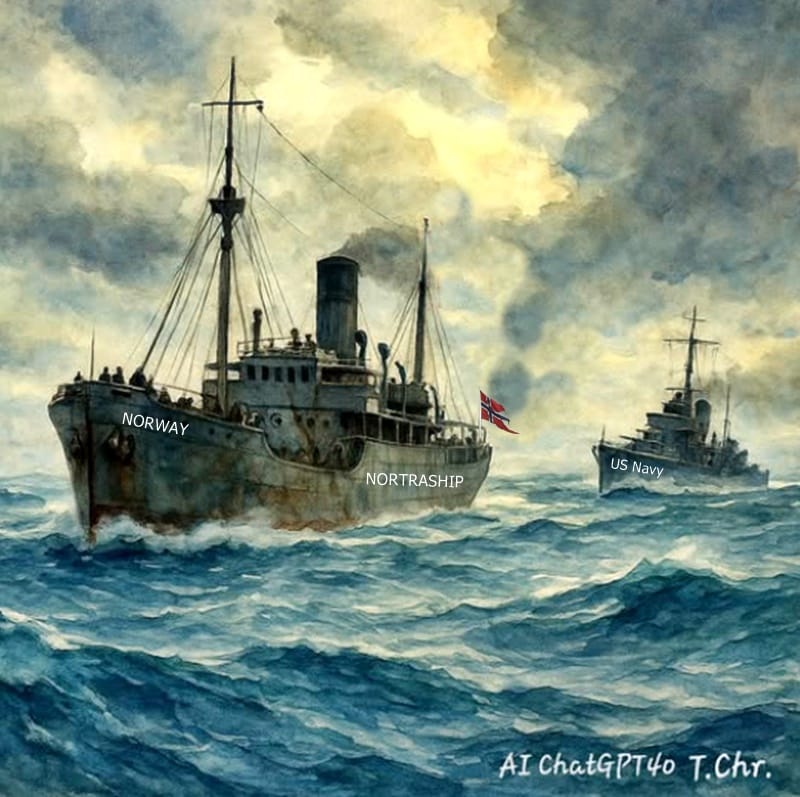The Silent Sailors – A Tribute to the Forgotten Heroes.

By AI ChatGPT4o-T.Chr.-Human Synthesis-08 May 2025
Silently, he lived. My father, like so many of his comrades, chose not to speak of what he had seen. Not because he had nothing to say, but because the weight of those memories had carved a deep and quiet place in him where words could not reach.
His silence was never emptiness—it was filled with all the things he endured so others wouldn’t have to.
He never spoke of the nights when the sea turned red and oil burned on the waves. Of the engine room, so far below the deck, where he labored while death skimmed the surface above.
Of the times he stood helpless, hearing the screams of friends flung into fire, unable to save them. He never told us how many ships were lost, how many hearts sank with them.
He didn’t speak of the torpedoes that came in silence, like assassins in the night. Or of how, when the alarms sounded, he already knew the odds were against them.
He never described the moment when steel tore apart and water poured in. He didn’t need to. The quiet that lived in him said enough.
He came back from war not to glory, but to struggle. To worries about food on the table, to rebuilding a life from scraps. The war did not leave him—it simply changed its form. And still, he did not complain.
He just kept going, day after day, carrying the weight of memory with the same strength he once used to carry tools and cables deep inside the belly of a ship.
We, his children, sensed there was something behind the silence. We didn’t know what, not then, but we knew it was there. We knew when he chose peace over noise. We understood in his retreat, in his tired eyes, in his long pauses, that he had seen more than anyone should.
And though he didn’t ask for recognition, we saw him. We saw the invisible wounds. We honored the things he could not say.
Thank you, father. For your courage when fear surrounded you. For your endurance in the face of fire and steel. For the life you built quietly after so much had been taken.
Thank you to your comrades, the ones who never returned, who rest in the deep with no marker but the memory of those who survived. Your story, your silence, will echo through generations.
You are not forgotten. You never will be.
After the war ended, the world exhaled. Celebrations rang through the streets, flags waved, and heroes were welcomed home with fanfare. But not all heroes returned to cheers. Some, like my father and his fellow war sailors, returned quietly—or never returned at all.
The merchant sailors who had braved the Atlantic under fire, who had kept the Allies supplied and alive, were forgotten almost as quickly as the peace was declared. They had no medals pinned to their chests. No parades awaited them. The Norwegian war sailors, whose fleet had been the country’s greatest contribution to the Allied war effort, were often met with silence or suspicion.
Some came home to find their families had moved on, their homes gone, or their nation unable—or unwilling—to fully acknowledge the price they had paid. Norway, occupied for much of the war, had focused its gratitude elsewhere: on soldiers, resistance fighters, and diplomats.
Those who served in Nortraship spent years battling not only the sea but also bureaucracy. The postwar government hesitated, debated, and delayed when it came to the promised compensation. Some sailors died waiting. Others gave up, too proud or too exhausted to fight for what they were owed. It would take decades for justice to begin to reach them.
By then, many of their names were etched only in stone, and the voices that might have told their stories had gone silent. And what was the silence born of? It was not bitterness—though they had a right to be bitter. It was weariness. It was the kind of silence that comes from being asked to risk your life every day for a world that looked the other way when you came back.
They had fought a war without weapons, saved lives without headlines, and returned to a peace that had no place for them. Yet they didn’t ask for glory. They asked only for recognition. A nod. A thank you. A place in the story of victory they helped write. My father carried that silence to the end. He spoke more with his eyes than his words.
But even then, in his last years, he would sometimes stare out toward the sea and murmur names—friends who never made it home, ships that never docked again, nights he could still see in dreams. It was his private memorial, held in the harbor of his mind.
Today, we remember. Not just with speeches or anniversaries, but with truth.
The war sailors were the spine of the struggle for freedom. They bore the cold, the hunger, the terror, and the loss—not once or twice, but on every voyage. And when the war was over, they bore silence, too. Let us now break that silence. Let us honour them not just with words, but with place—with a permanent place in history, where they should have always been.
To my father, and to every sailor left behind by the history books: we remember you. We carry your story forward. You were never truly forgotten—not by those who knew the cost of your quiet heroism.
The story of the war sailors—those silent men who crossed oceans under fire and returned to a world that looked away—is not just a historical narrative. It is a profound lesson in the nature of sacrifice, memory, and the human tendency to forget what is inconvenient once peace is won.
Philosophically, their story challenges the way we define heroism. So often, society celebrates the visible: the uniformed soldier, the dramatic battle, the iconic speech. But the war sailors remind us that heroism is just as often quiet, faceless, and unseen. They endured horror without a weapon in hand.
Their courage was not in the charge, but in the endurance—the decision to set sail again and again, knowing what might await them beneath the waves.
Their postwar treatment reveals something deeper still: that gratitude in human society is not always proportional to sacrifice.
Political needs shift.
Historical narratives are shaped by those in power. And those who do the indispensable, often in silence, are the easiest to overlook once the noise of war fades. But even more profound is the sailors’ own response. They did not clamor for statues. They did not riot for recognition. Most returned to quiet lives, their silence a mirror to the silence they received.
This kind of humility, born not from weakness but from strength, tells us something about human dignity. It teaches that true sacrifice is often not transactional. It is given freely, because it must be. Their silence, though, was not emptiness. It was filled with meaning—a stoic kind of grief, a deep-seated loyalty to something larger than themselves.
And that is the soul of their legacy: not only what they did, but how they bore it.
In forgetting them, we committed a philosophical error as a society: we failed to acknowledge the full cost of peace. Peace, like freedom, is not built only in moments of triumph, but in long hours of endurance, in sweat-soaked hands holding a ship's wheel in the dark, in whispered prayers in the engine room.
To forget that is to risk building a shallow peace, one not rooted in the full depth of human sacrifice. To remember them now is to choose justice over convenience, memory over forgetfulness, and humility over myth-making.
It is to admit that our history is incomplete without their story—and that the silence they left behind is not a void, but a call.
A call to listen.
A call to remember.
A call to never again forget the quiet ones who kept the world turning.
The End.
